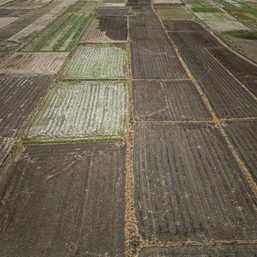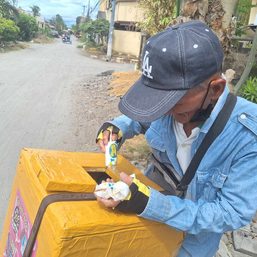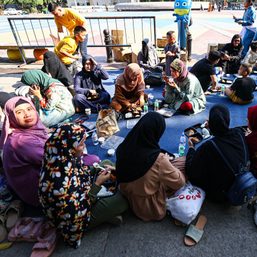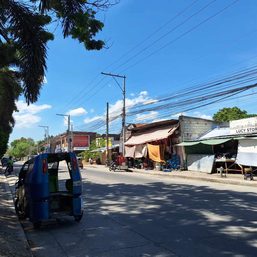SUMMARY
This is AI generated summarization, which may have errors. For context, always refer to the full article.

GENERAL SANTOS, Philippines – Education officials noted a surge in the number of students with ailments blamed on rising temperatures in General Santos City, prompting school authorities to either suspend classes or switch back to online learning methods starting Tuesday, April 2.
The Department of Education (DepEd) in General Santos City reported that, in recent days, at least 2,557 students have complained of severe headaches due to the high heat index, which measures how hot it feels when humidity is combined with the actual air temperature.
About 291 other students have experienced nosebleeds, a condition attributed to the intense heat, according to General Santos Schools Superintendent Isagani dela Cruz, citing reports gathered from various schools across the city.
The dry weather conditions and soaring temperatures prompted Dela Cruz to ask the city government to order the suspension of classes in General Santos.
Based on the DepEd recommendation, General Santos Mayor Lorelie Pacquiao issued Executive Order No. 19-2024, ordering the suspension of all face-to-face classes in all levels in both public and private schools in General Santos from April 2 to April 5 “unless otherwise extended or lifted earlier.”
The state-run Mindanao State University (MSU) in General Santos, however, said its classes would be held online to avoid a disruption.
Norman Ralph Isla, MSU-General Santos campus secretary, said the university’s classes will be held either synchronously or asynchronously and will be supervised by the heads of different academic departments.
Sarangani Governor Rogelio Pacquiao also ordered on Tuesday the suspension of face-to-face classes in all levels from April 3 to 19.
In South Cotabato province, the mayors of Banga and Tantangan towns opted to suspend afternoon face-to-face classes to protect students from the heat that typically worsens in the afternoon.
Tantangan Mayor Timee Torres-Gonzales said they have coordinated with the DepEd so their schools would revert to blended learning methods until April 15. Gonzales said the setup is meant not to disrupt the students’ learning schedules.
In Banga, Mayor Evangeline Palencia announced that afternoon classes would be suspended until April 30 to safeguard students’ health against the scorching heat.
Damage to agriculture
The dry weather conditions and scorching heat have also been taking a toll on agriculture in the Soccsksargen region.
The Municipal Disaster Risk Reduction Management Council (MDRRMC) in Alabel, Sarangani province, for instance, recommended to the municipal council to declare the town as being in a state of calamity due to losses caused by the prevailing dry conditions and soaring temperatures.
The MDRRMC also adopted a motion to reprogram a trust fund amounting to almost P4 million to aid farmers affected by the dry spell.
Alabel Mayor Paul Salarda sought a comprehensive detailed report about the extent of the damage to crops such as corn, coconuts, and bananas, as well as livestock and poultry in the municipality.
Officials of the Department of Agriculture (DA) in Soccsksargen said they could not say exactly what the extent of the damage was in the region because they have yet to receive reports from local governments in the region.
DA Regional Director John Pascual said they have not even received requests for assistance. He downplayed the impact of the El Nino phenomenon on the agriculture sector in the Soccsksargen region, saying the damage was not severe and that mitigating measures were in place.
Soccsksargen, which consists of the provinces of South Cotabato, Cotabato, Sultan Kudarat, Sarangani, and the cities of General Santos, Koronadal, Tacurong, and Kidapawan, has been seeing less rainfall amid dry weather conditions and intense heat.
On a national scale, the DA said the El Niño phenomenon has damaged at least P1.3 billion worth of agricultural crops, poultry, and livestock as of mid-March.
Wake-up call
Meanwhile, environmentalists said the prevailing weather conditions should serve as a wake-up call for the government to do what is right for the environment.
Elizabeth Ramos, chairperson of the Maitum Advocates for Sustainable Environment (MASE), said, “We need some serious and dedicated efforts, not mere lip service or band-aid solutions.”
Another group, the Council for Climate and Conflict Action Asia-Early Response Network (CCAA-ERN), said it has monitored the drying of wells and water sources in many villages and municipalities in Mindanao, particularly in the Bangsamoro Autonomous Region in Muslim Mindanao (BARMM), Central and Northern Mindanao.
“Farmers are now unable to grow essential crops and vegetables and are struggling to provide food for their families. In many major rice granaries in Northern Luzon and Western Visayas, farmers’ decisions for the planting season are being held back because of the lack of water,” read part of a March 22 statement of the CCAA-ERN.
The group called on the government to declare a state of calamity in many agricultural areas that are now reeling from the effects of El Niño and prioritize farmers and fisherfolk to prevent food insecurity.
CCAA-ERN also asked the government to direct the local disaster risk reduction management officers to closely monitor their areas, especially wells that are starting to dry up and set aside funds for emergency provisioning to avert hunger.
“It is useful to invest in water tankers as early as now for the immediate rationing of water when sources become exhausted…. Funds should be invested for the rehabilitation and building of new wells to ensure the adequate supply of water to communities,” it said.
CCAA-ERN stressed the need to protect wells and other sources of water that are still supplying and sustaining communities.
The group warned, “The drought caused by the El Niño phenomenon is fueling uncertainty and insecurity that is endangering the coping mechanisms and traditional social protection practices in communities. Most people claim it’s the drought, but we have monitored water resources, and the lack of it, and we have seen a major decline in the quality and quantity of water in the past years. The ongoing dry spell has only aggravated what is already a worsening situation brought about by climate change.” – Rappler.com
Add a comment
How does this make you feel?

![[OPINYON] Tungkol sa naging viral na social media conjecture](https://www.rappler.com/tachyon/2024/07/thought-leaders-conjecture-07262024.jpg?resize=257%2C257&crop_strategy=attention)





















There are no comments yet. Add your comment to start the conversation.